Hagai Taitelbaum
RefVNLI: Towards Scalable Evaluation of Subject-driven Text-to-image Generation
Apr 24, 2025Abstract:Subject-driven text-to-image (T2I) generation aims to produce images that align with a given textual description, while preserving the visual identity from a referenced subject image. Despite its broad downstream applicability -- ranging from enhanced personalization in image generation to consistent character representation in video rendering -- progress in this field is limited by the lack of reliable automatic evaluation. Existing methods either assess only one aspect of the task (i.e., textual alignment or subject preservation), misalign with human judgments, or rely on costly API-based evaluation. To address this, we introduce RefVNLI, a cost-effective metric that evaluates both textual alignment and subject preservation in a single prediction. Trained on a large-scale dataset derived from video-reasoning benchmarks and image perturbations, RefVNLI outperforms or matches existing baselines across multiple benchmarks and subject categories (e.g., \emph{Animal}, \emph{Object}), achieving up to 6.4-point gains in textual alignment and 8.5-point gains in subject consistency. It also excels with lesser-known concepts, aligning with human preferences at over 87\% accuracy.
On Reference (In-)Determinacy in Natural Language Inference
Feb 09, 2025



Abstract:We revisit the reference determinacy (RD) assumption in the task of natural language inference (NLI), i.e., the premise and hypothesis are assumed to refer to the same context when human raters annotate a label. While RD is a practical assumption for constructing a new NLI dataset, we observe that current NLI models, which are typically trained solely on hypothesis-premise pairs created with the RD assumption, fail in downstream applications such as fact verification, where the input premise and hypothesis may refer to different contexts. To highlight the impact of this phenomenon in real-world use cases, we introduce RefNLI, a diagnostic benchmark for identifying reference ambiguity in NLI examples. In RefNLI, the premise is retrieved from a knowledge source (i.e., Wikipedia) and does not necessarily refer to the same context as the hypothesis. With RefNLI, we demonstrate that finetuned NLI models and few-shot prompted LLMs both fail to recognize context mismatch, leading to over 80% false contradiction and over 50% entailment predictions. We discover that the existence of reference ambiguity in NLI examples can in part explain the inherent human disagreements in NLI and provide insight into how the RD assumption impacts the NLI dataset creation process.
KITTEN: A Knowledge-Intensive Evaluation of Image Generation on Visual Entities
Oct 15, 2024



Abstract:Recent advancements in text-to-image generation have significantly enhanced the quality of synthesized images. Despite this progress, evaluations predominantly focus on aesthetic appeal or alignment with text prompts. Consequently, there is limited understanding of whether these models can accurately represent a wide variety of realistic visual entities - a task requiring real-world knowledge. To address this gap, we propose a benchmark focused on evaluating Knowledge-InTensive image generaTion on real-world ENtities (i.e., KITTEN). Using KITTEN, we conduct a systematic study on the fidelity of entities in text-to-image generation models, focusing on their ability to generate a wide range of real-world visual entities, such as landmark buildings, aircraft, plants, and animals. We evaluate the latest text-to-image models and retrieval-augmented customization models using both automatic metrics and carefully-designed human evaluations, with an emphasis on the fidelity of entities in the generated images. Our findings reveal that even the most advanced text-to-image models often fail to generate entities with accurate visual details. Although retrieval-augmented models can enhance the fidelity of entity by incorporating reference images during testing, they often over-rely on these references and struggle to produce novel configurations of the entity as requested in creative text prompts.
A Dataset for Sentence Retrieval for Open-Ended Dialogues
May 24, 2022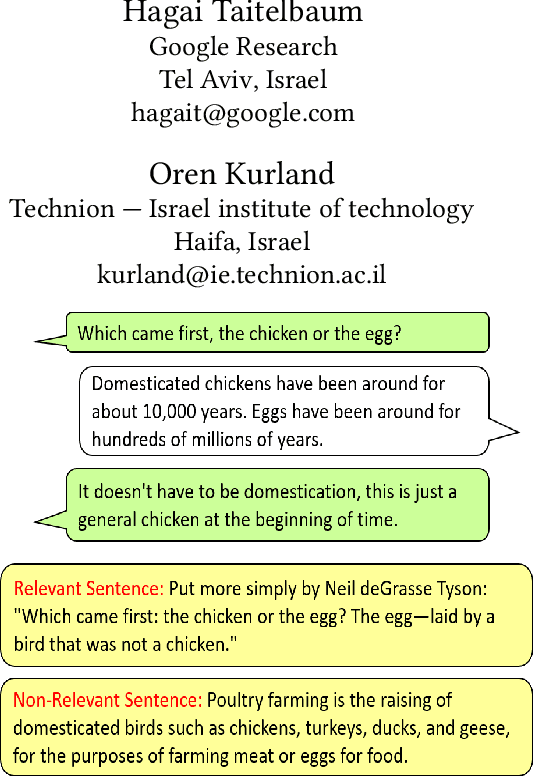

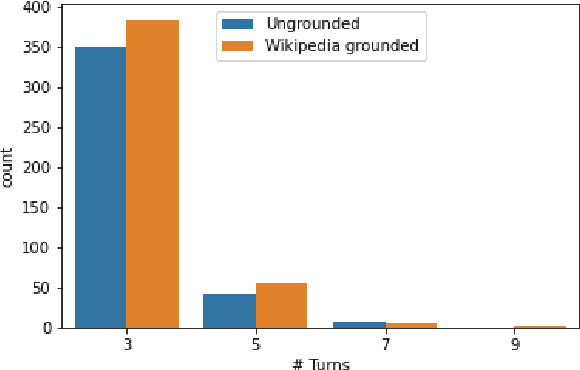

Abstract:We address the task of sentence retrieval for open-ended dialogues. The goal is to retrieve sentences from a document corpus that contain information useful for generating the next turn in a given dialogue. Prior work on dialogue-based retrieval focused on specific types of dialogues: either conversational QA or conversational search. To address a broader scope of this task where any type of dialogue can be used, we constructed a dataset that includes open-ended dialogues from Reddit, candidate sentences from Wikipedia for each dialogue and human annotations for the sentences. We report the performance of several retrieval baselines, including neural retrieval models, over the dataset. To adapt neural models to the types of dialogues in the dataset, we explored an approach to induce a large-scale weakly supervised training data from Reddit. Using this training set significantly improved the performance over training on the MS MARCO dataset.
TRUE: Re-evaluating Factual Consistency Evaluation
Apr 11, 2022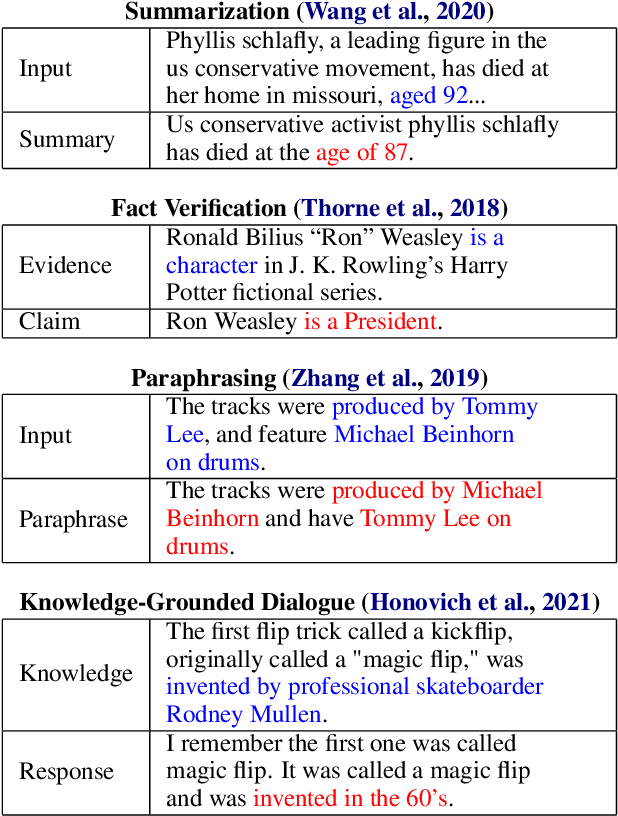
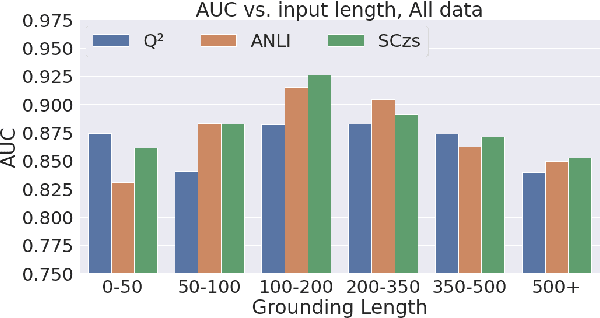
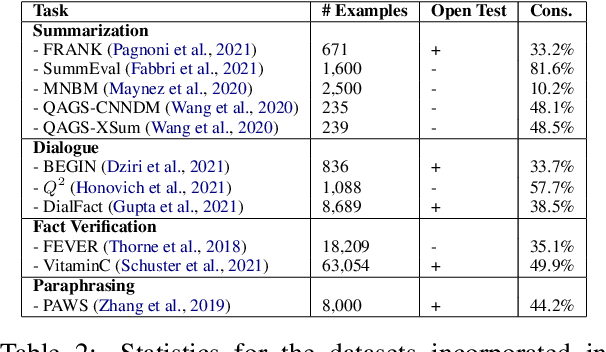
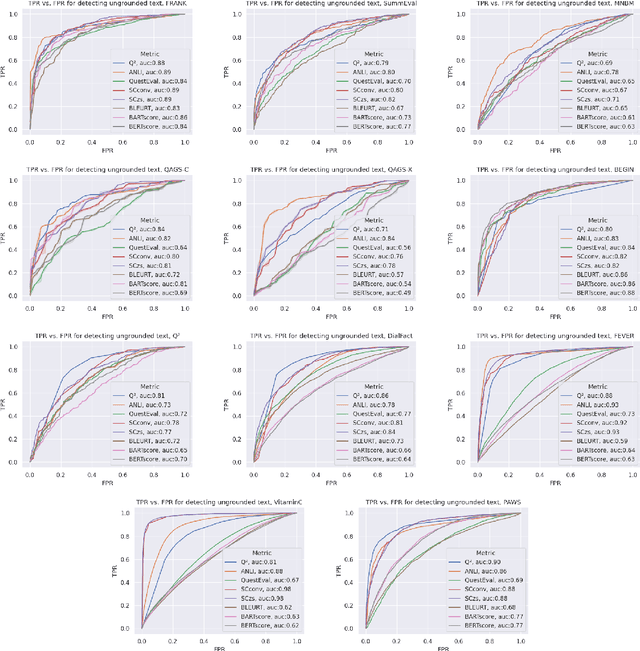
Abstract:Grounded text generation systems often generate text that contains factual inconsistencies, hindering their real-world applicability. Automatic factual consistency evaluation may help alleviate this limitation by accelerating evaluation cycles, filtering inconsistent outputs and augmenting training data. While attracting increasing attention, such evaluation metrics are usually developed and evaluated in silo for a single task or dataset, slowing their adoption. Moreover, previous meta-evaluation protocols focused on system-level correlations with human annotations, which leave the example-level accuracy of such metrics unclear. In this work, we introduce TRUE: a comprehensive study of factual consistency metrics on a standardized collection of existing texts from diverse tasks, manually annotated for factual consistency. Our standardization enables an example-level meta-evaluation protocol that is more actionable and interpretable than previously reported correlations, yielding clearer quality measures. Across diverse state-of-the-art metrics and 11 datasets we find that large-scale NLI and question generation-and-answering-based approaches achieve strong and complementary results. We recommend those methods as a starting point for model and metric developers, and hope TRUE will foster progress towards even better methods.
 Add to Chrome
Add to Chrome Add to Firefox
Add to Firefox Add to Edge
Add to Edge